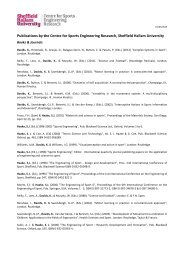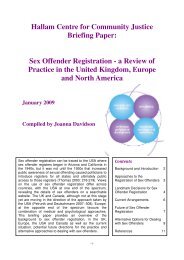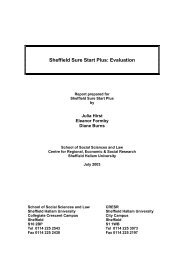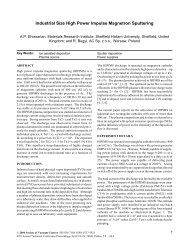The exercise of judicial discretion in rent arrears cases - Sheffield ...
The exercise of judicial discretion in rent arrears cases - Sheffield ...
The exercise of judicial discretion in rent arrears cases - Sheffield ...
Create successful ePaper yourself
Turn your PDF publications into a flip-book with our unique Google optimized e-Paper software.
Chapter 4: Consistency and difference<br />
Introduction<br />
In this chapter we exam<strong>in</strong>e the issues <strong>of</strong> consistency both between courts, and also between<br />
judges sitt<strong>in</strong>g <strong>in</strong> the same court. “Consistency” is taken to mean that <strong>cases</strong> with broadly<br />
similar features (primarily level <strong>of</strong> <strong>arrears</strong>, f<strong>in</strong>ancial and other circumstances <strong>of</strong> the tenant)<br />
result <strong>in</strong> broadly similar outcomes, wherever the case was heard, and regardless <strong>of</strong> which<br />
district judge heard it. We also exam<strong>in</strong>e consistency <strong>in</strong> terms <strong>of</strong> approach, and whether<br />
differences <strong>in</strong> approach between judges may result <strong>in</strong> diffe<strong>rent</strong> outcomes. This chapter<br />
makes use <strong>of</strong> the <strong>in</strong>formation from the focus groups to establish the perceptions on this<br />
issue <strong>of</strong> key stakeholders: landlords, advice organisations, and solicitors. <strong>The</strong> quantitative<br />
data <strong>in</strong> respect <strong>of</strong> recorded <strong>cases</strong> has been analysed together with observations <strong>of</strong> the<br />
courts and their hear<strong>in</strong>gs to exam<strong>in</strong>e whether consistency does <strong>in</strong> fact appear to be<br />
achieved. Qualitative data from the <strong>in</strong>terviews with district judges is used to suggest<br />
reasons why diffe<strong>rent</strong> outcomes may result from appa<strong>rent</strong>ly similar <strong>cases</strong>.<br />
Perceptions <strong>of</strong> focus group participants<br />
Each <strong>of</strong> the focus groups started with an open<strong>in</strong>g discussion <strong>of</strong> the participants’ experiences<br />
at the diffe<strong>rent</strong> courts they attended <strong>in</strong> their locality. <strong>The</strong>se discussions <strong>in</strong>variably revealed<br />
perceived differences, <strong>in</strong> outcome, approach, and process, between diffe<strong>rent</strong> courts and<br />
between diffe<strong>rent</strong> judges. <strong>The</strong> focus group participants, both claimant and defendant<br />
representatives, <strong>in</strong> all three geographical areas, were concerned at this lack <strong>of</strong> consistency.<br />
Each <strong>of</strong> the focus groups was asked to consider which factors, <strong>in</strong> the op<strong>in</strong>ion <strong>of</strong> the<br />
participants, most <strong>in</strong>fluenced <strong>judicial</strong> <strong>discretion</strong>. Both tenant representatives and participants<br />
who represented claimants were agreed that the follow<strong>in</strong>g factors (without ascrib<strong>in</strong>g any<br />
priority) were those which most <strong>in</strong>fluenced <strong>discretion</strong>:<br />
hous<strong>in</strong>g benefit;<br />
the level <strong>of</strong> <strong>rent</strong> <strong>arrears</strong>;<br />
whether an agreement had been reached;<br />
attendance <strong>of</strong> the defendant;<br />
the nature <strong>of</strong> the tenant; and<br />
district judges’ familiarity with the claimant landlord’s representative.<br />
21
















